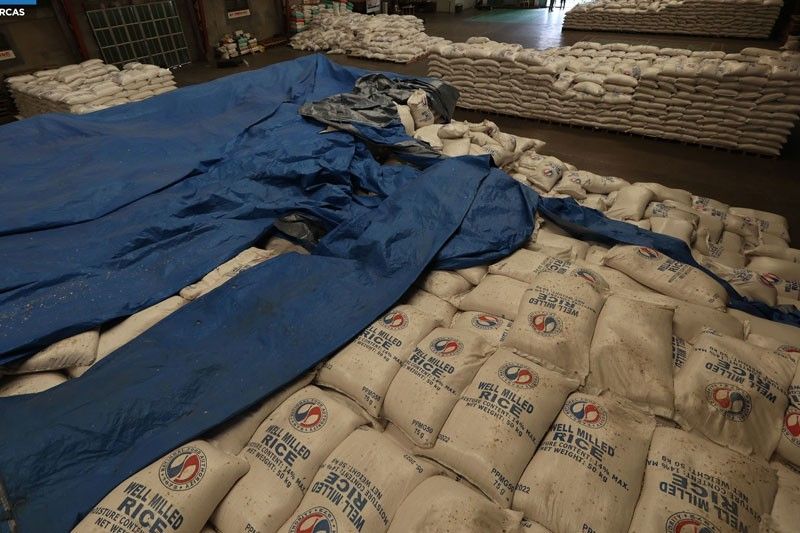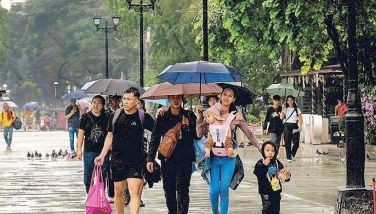President Marcos backs review of Rice Tariffication Law

MANILA, Philippines — President Marcos backs the review of the Rice Tariffication Law (RTL) or Republic Act 11203 to return the powers of the National Food Authority (NFA) amid the issue on rice supply and spike in prices, a ranking official of the Department of Agriculture (DA) said yesterday.
In an interview with The STAR, Agriculture Assistant Secretary and deputy spokesman Rex Estoperez said that Marcos first mentioned his support for review of the RTL during the meeting with stakeholders at Malacañang organized by the Philippine Council for Agriculture and Fisheries (PCAF).
“President Marcos said, ‘review what needs to be reviewed necessary to empower the NFA.’ Its (previous functions) should be returned. You cannot totally remove its powers,” Estoperez said.
The RTL removes the various regulatory powers of the NFA, from import licensing to warehouse inspection.
“During the dialogue with PCAF, the President cited the need to review (the RTL) and look again at the functions of the NFA. If there is a need to amend its mandate like for example if you cannot buy at P19 (per kilo of palay) what should be done? Will it increase the buying price, will the government provide subsidies?” Estoperez said.
Estoperez added that Agriculture Senior Undersecretary Domingo Panganiban would also recommend to Marcos to prioritize the amendments of the RTL.
“The rice was not included in the priority measures despite being a staple food and it is a political commodity,” Estoperez said.
According to Estoperez, prior to the implementation of the RTL, the required inventory of rice was at 90 days – 60 days for the private sector and 30 days inventory for the NFA. Under the RTL, the private sector needs at least 81 days inventory and nine days stocks for NFA.
The current remaining stock of the NFA is only pegged at 46,000 metric tons, good for at least 1.3 days.
At the same time, Estoperez said that based on the dialogue with the rice importers, they want to include in the amendment of the RTL the sanction of exporters who will not honor the contracts.
He said the recommendation of the importers will be submitted to Panganiban, who will then submit the feedback to Malacañang.
On the other hand, Estoperez said importers committed to sell 100,000 five-kilo sacks of rice at P38 per kilo in depressed areas like Baseco to help the poor amid the spike in retail prices of the staple food.
Based on monitoring of the DA, the retail price of local regular milled rice is sold as high as P50 per kilo; local well-milled rice, P52 per kilo; local premium rice, P56 per kilo; and local special rice, P60 per kilo while imported rice is sold as high as P65 per kilo.
P500 million farmer’s loan
State-run Development Bank of the Philippines (DBP) has lent a P500-million loan to boost rice production in Albay and contribute to the country’s food security.
DBP has extended the credit assistance to farmer cooperatives in Albay to advance sustainable and efficient farming practices in the province.
The financing will support the Digital Rice Clustered Farming (DCRF) project under the bank’s Expanded Rice Credit Assistance as part of the Rice Competitiveness Enhancement Fund.
The project combines advanced automation, precision farming techniques, and data analytics to optimize resource utilization and increase small farmers’ annual yield by up to 30 percent.
DBP president and CEO Michael de Jesus noted that innovative farming initiatives could elevate the local agriculture sector while empowering Filipino farmers amid an ever-changing agricultural landscape.
The DCRF will consolidate individual farm holdings into larger farms, which would result in lower production costs and improve farmer’s income by leveraging economies of scale. It would also utilize digital platforms like satellite imagery, machine learning and artificial intelligence.
These are seen to boost price production by 28,000 metric tons annually with 2,000 hectares of land, with upside production by up to 70,000 MT for a cluster farm size of 5,000 hectares. The project will be piloted in Albay with an initial five farmer cooperatives to participate in the cluster farm project.
Anti-poor, insensitive
Rice watchdog group Bantay Bigas on Thursday slammed the proposal of Trade Secretary Alfredo Pascual to consider other food like potatoes, corn and sweet potatoes, as an alternative to rice.
“It (was proposed) for the sake of commenting. There was no study even done. Potatoes and sweet potatoes are more expensive as alternatives to rice,” Bantay Bigas spokesperson Cathy Estavillo said. “The proposal of Secretary Pascual is anti-poor and insensitive.”
Estavillo said that aside from the retail prices of rice, other basic commodities are also increasing, adding that farmers are not spared as despite the spike in price of palay, they always suffer losses.
According to Estavillo, the government should instead impose price control to stop the increase in retail prices of the grains. She added that the DA should instead provide subsidies to the farmers to strengthen local production.
Government procurement
By raising the palay procurement price of the NFA from P19 to P22, farmers can be convinced to sell to the government instead of local palay traders, Samahang Industriya ng Agrikultura president Rosendo So told The STAR.
“Definitely, farmers would sell their produce to the higher buying price of commercial palay traders rather than to much lower buying price of the NFA that translated to a lower volume of stockpiled unhusked rice of the government,” So pointed out
During a congressional meeting on July 16, So said that Agriculture Undersecretary Merceditas Sombillo has already agreed to raise the P19 per kilo government-support price of the NFA to P22 per kilo.
Raising the buying price of NFA to P22 per kilo with an incentive of up to P3 per kilo would encourage farmers to sell their produce to the grains agency, So noted. At P25 per kilo of palay, this would translate to a P42-P44 per kilo of rice in the local market.
Federation of Free Farmers national manager Raul Montemayor said that while farmers cannot immediately provide the needed supply of corn, potatoes and sweet potatoes, it would encourage them to plant crops.
“Well, it is not immediate as we are a rice-eating country. The market for these crops is still limited but once the demand increases, I am sure a lot of farmers will plant to supply the needed demand,” Montemayor added.
“These are very good options for farmers. Instead, our focus is the importation of rice. We should look for other crops as substitute for rice.” — Louise Maureen Simeon, Ramon Efren Lazaro
- Latest
- Trending




























